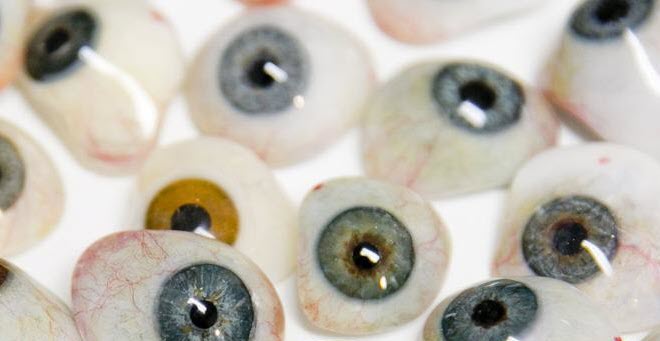Resources
Resources
Caring For Your Prosthetic Eye
Caring For Your Prosthetic Eye
Below are basic care instructions for your prosthetic eye. If you have any questions about the information below, you can always contact us!
Below are basic care instructions for your prosthetic eye. If you have any questions about the information below, you can always contact us!
If this is your first artificial eye since surgery was performed on your eye, some healing will still be taking place. The prosthesis may "settle in" as swelling goes down in the eye socket. If this is the case, we will "build-up" the prosthesis to the correct size. Allow up to three hours for this visit.
It is strongly recommended that you return to our office once a year to have your prosthesis polished. Usually there is a build-up of protein and salt on the surface of the prosthesis. Polishing removes these potentially irritating deposits. Your ocularist will also evaluate the prosthesis fit and appearance. Sometimes an adjustment may be called for due to changes in the eye socket's tissue.
Many of our patients do not need to remove their prosthesis between yearly visits to our office. Generally, it is good to remove the prosthesis as seldom as possible to avoid irritating the sensitive lining of the eye socket, called the conjunctiva. There are a few exceptions to this rule. Your ocularist will help you to determine what is best in your individual case.
Removal and reinsertion of the prosthetic eye is quite easy, and you will be instructed on how to do this. Always wash your hands before handling the prosthesis.
Note: Mucus secretion can be flushed away with warm water or eye-wash.
Some artificial eye-wearers experience "dry eye" due to a lack of lubrication. Your ocularist can help you determine what lubricating drops might be most helpful when this happens.
If the prosthetic eye must be left out of the eye socket for some reason, store it safely in a plastic container. Never leave a prosthesis wrapped only in facial tissue. Many prosthetic eyes have been accidentally thrown away that were wrapped only in a tissue. The prosthesis may be stored "dry", or in water, or saline. If it is stored "wet" the liquid should be changed daily.
Most patients do not have to clean the prosthesis. For those that need to do so, it is recommended that you use liquid soap such as hand soap or baby shampoo and water.
The prosthesis may be soaked in hydrogen peroxide as a means of disinfection if necessary. Do not use alcohol. Alcohol can damage the plastic beyond repair.
Other Points to Remember:
Other Points to Remember:
- If you must rub the eye, rub toward your nose with the eyelids closed. Wiping away from the nose may cause the prosthesis to fall out. Vigorous rubbing may cause the prosthesis to rotate out of position.
- Pediatric Warning: Prosthetic eyes and conformers are potential choking hazards for infants and small children.
- If you are sighted in one eye, wear glasses to protect your eye. Ask your doctor to recommend lenses that will be safe for you.
- Swimming may result in loss of the prosthesis. Consider wearing goggles for swimming.

Other Points to Remember:
Other Points to Remember:

- If you must rub the eye, rub toward your nose with the eyelids closed. Wiping away from the nose may cause the prosthesis to fall out. Vigorous rubbing may cause the prosthesis to rotate out of position.
- Pediatric Warning: Prosthetic eyes and conformers are potential choking hazards for infants and small children.
- If you are sighted in one eye, wear glasses to protect your eye. Ask your doctor to recommend lenses that will be safe for you.
- Swimming may result in loss of the prosthesis. Consider wearing goggles for swimming.
